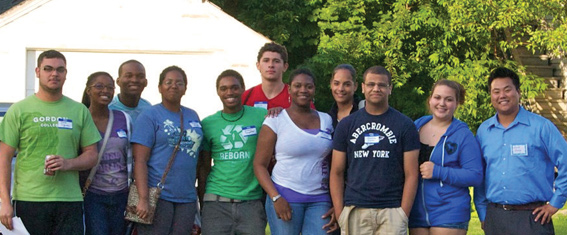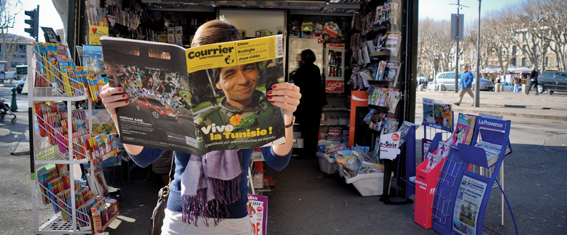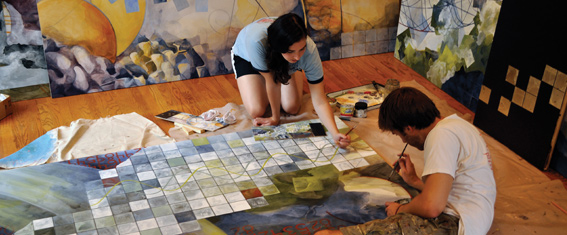STILLPOINT Archive: last updated 11/21/2011
A New Cohort of Clarendon Scholars

This year’s Clarendon Scholars include 10 new students—from New York, Connecticut and Massachusetts. The group is led by Scott Hwang ’05, who recently joined the Gordon staff as director of the Clarendon Program and advisor to ALANA.
Clarendon Scholars are made up of diverse students who are supported through mentoring, leadership training and support from their peers. Each scholar receives a scholarship and is equipped with tools to solve community issues and is prepared for service in the city after graduation.
“They’re an eclectic group with a wide range of backgrounds, ethnicities, passions and interests,” says Scott. “Each of them has a solid relationship with Jesus. I’m really looking forward to working with them this year.”
Conflict in the Middle East: A Hands-on Education
After spending two semesters abroad—one in Oxford, England, during the fall of 2010, and the other in the Middle East during the spring of 2011—David Boticello ’12 knows he’s studying the right subjects in college. As a political philosophy and history double major with a concentration in revolution and social justice, David found himself in the right place at the right time while in the Middle East: He was there, along with other Gordon students, during the first eight days of the Egyptian revolution.
While most people were afraid and the country was in turmoil, David was fascinated to watch the whole thing unfold. “Though we were fairly removed from the fighting, our Egyptian friends kept us informed about what was going on before they left to protest. When they returned, they continued to update us.
“Meeting everyday people—school- teachers, students, bank employees and café baristas—and speaking in solidarity with young Egyptians in places like Istanbul, Jerusalem and Jordan, taught me the passionate and emotional side of revolution, which classrooms and professors can only aspire to impart. The Egyptian revolution, and I think revolution in general, is a creature of a different sort than we as Americans can truly know—a thing we might be grateful for if we had the sense. I certainly left a part of my heart in Egypt.
“The Egyptian revolution was active proof that my field of interest is not only valid but necessary,” says David. “Egypt provided unparalleled practical experiences, which worked as the perfect counterpoint to the theoretical knowledge I gained at Oxford—I was accidentally tear-gassed in Tahrir Square, saw protesters clash with police in Luxor, and spoke with young Egyptians. Some were agitated against their government while others were more cautious, wary of change.
“Politics in the Middle East is almost foreign to America because we haven’t had a good revolution in almost 150 years. In America government is stable and power transfers peacefully. In a country where you wake up to tanks in the streets and government buildings ablaze, government- as-usual simply doesn’t exist.”
David spent his summer pursuing his interest in history, living in a cabin in the woods, and working for the Gordon College Institute for Public History in Salem, Massachusetts. He is the property caretaker for a living history museum of Puritan life in 1630, and, as a result, he is living, eating, sleeping on site, as if he lived in the 17th century. “In a way I’m living like Henry David Thoreau did,” he explains. “While I disagree with Thoreau’s conclusions, I am beginning to understand the motivation and opportunity that lie behind a purposeful separation from society for a short period of time in order to better understand the civil order, and perhaps one day the reasons behind civil disorder—namely, revolution.”
David is currently in the process of applying for a Fulbright Scholarship to study politics in the Middle East. He’d also like to pursue graduate studies in international law.
Photo Journal: Aix-en-Provence

"There are several reasons I chose to go to France for the year," explains Rebecca Wolseley ’12. "I wanted to reconnect with my native culture, to attain a better grasp of the language, and to expose myself to a different way of living and learning for an extended period of time. This photo journal contains some of my favorite things about my semester abroad."
Framework and Fluidity: A Senior Class Gift

At Commencement the senior class announced that their gift to the College was a mural, painted by seniors Anna Taylor and Garrett Ames-Ledbetter. The mural, in panels, visually represents the departments included in the Division of the Natural Sciences, Mathematics and Computer Science.
The completed work is displayed in the long hall on the first floor of the Ken Olsen Science Center—an abstraction delving into the theme of “framework and fluidity,” exploring the scientist’s desire to “construct systems of understanding as jumping-off points for further exploration,” Anna explains.
“This pursuit of understanding honors God,” she continues. “However, these frameworks are held with a certain amount of humility and the acknowledgment that they are ultimately approximations of the truth. The possibility of a newer and truer framework always looms.”
As a symbol of the forthcoming painting and a farewell gift to the Carlbergs, Anna and Garrett painted an image of an alewife from the Gordon ponds, which was presented to President Carlberg at Commencement. The artwork was installed in the Science Center in early October.The panels detail math, physics, biology, kinesiology, chemistry and computer science. Read more >>
| Share this story: |   |
NEXT: People and Programs